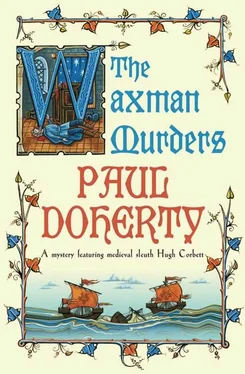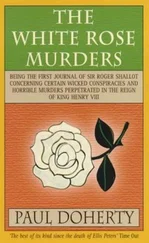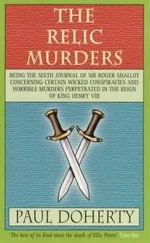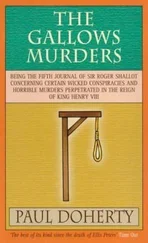Paul Doherty - The Waxman Murders
Здесь есть возможность читать онлайн «Paul Doherty - The Waxman Murders» весь текст электронной книги совершенно бесплатно (целиком полную версию без сокращений). В некоторых случаях можно слушать аудио, скачать через торрент в формате fb2 и присутствует краткое содержание. Год выпуска: 0101, Жанр: Исторический детектив, на английском языке. Описание произведения, (предисловие) а так же отзывы посетителей доступны на портале библиотеки ЛибКат.
- Название:The Waxman Murders
- Автор:
- Жанр:
- Год:0101
- ISBN:нет данных
- Рейтинг книги:3 / 5. Голосов: 1
-
Избранное:Добавить в избранное
- Отзывы:
-
Ваша оценка:
- 60
- 1
- 2
- 3
- 4
- 5
The Waxman Murders: краткое содержание, описание и аннотация
Предлагаем к чтению аннотацию, описание, краткое содержание или предисловие (зависит от того, что написал сам автор книги «The Waxman Murders»). Если вы не нашли необходимую информацию о книге — напишите в комментариях, мы постараемся отыскать её.
The Waxman Murders — читать онлайн бесплатно полную книгу (весь текст) целиком
Ниже представлен текст книги, разбитый по страницам. Система сохранения места последней прочитанной страницы, позволяет с удобством читать онлайн бесплатно книгу «The Waxman Murders», без необходимости каждый раз заново искать на чём Вы остановились. Поставьте закладку, и сможете в любой момент перейти на страницу, на которой закончили чтение.
Интервал:
Закладка:
Chapter 8
Desunt sermones, dolor sensum abtulit.
Words fail and sorrow numbs the senses.
Paulinus of AquileaHidden behind a line of trees, Sweetmead proved to be a splendid square three-storey building of shiny black timber and pink plaster which stood on a ragstone base behind its own red-brick curtain wall. The double gate to this had been flung open, and even though all the noonday bells were yet to ring, Castledene, Wendover, Parson Warfeld, Physician Desroches, Lady Adelicia, Berengaria and Lechlade were already gathered on the small pebble-strewn forecourt before the steps to the main door. Corbett noticed how the windows of the house were firmly shuttered. City guards stood everywhere, and had been there for some time judging from the rubbish strewn around the blackened circles in the snow where they’d built their campfires. Hasty introductions and salutations were exchanged. Corbett asked Castledene if Servinus had been seen. The Mayor shrugged.
‘No sign whatsoever, Sir Hugh. The roads are clogged; even so, I’ve sent more couriers to the nearest ports.’ He shook his head. ‘He must still be hiding in the city, though a foreigner would find it difficult to find any sanctuary here. I have given my men his description; sooner or later he’ll be seen.’
Corbett chewed on the corner of his lip and stared around.
‘Lady Adelicia.’ He beckoned her away from the sharp-eyed Berengaria.
‘Sir Hugh?’ Lady Adelicia drew close.
‘Madame, you are enceinte?’
Her cold blue eyes held his.
‘The father?’ Corbett asked. ‘Sir Rauf?’
‘My secret, Sir Hugh. More importantly, I cannot hang or burn, and why should I? I hated him but I did not kill him!’ Adelicia’s voice was quiet but she spat the words out, the curl of her lips turning that beautiful face ugly. Corbett turned away, his patience exhausted; he had decided on his course of action. He strode to the foot of the steps.
‘Open the door.’
He was weary of this Hodman’s bluff, of blundering around, of being poked and pushed like some blindfolded fool. Time was passing. He had questions to ask and they had to be answered. Wendover and the guards hurried to obey. Castledene came over to speak, but Corbett held up a gauntleted hand.
‘Sir Walter, I have decided on what I must do.’ He let his hand drop gently on the Mayor’s shoulder. ‘You must send two of your men back to your clerks in the Guildhall. I want,’ he squeezed Castledene’s shoulder, ‘every record, every scrap of parchment your chancery holds about the pirate Blackstock and his half-brother Hubert. They have to be brought here, now!’ He brushed aside Castledene’s protests and went up the steps. ‘And you.’ He grabbed Wendover by the arm. ‘Light all candles, lamps and lantern horns, refill braziers, every hearth must have a fire. Light the ovens, and then check the stores and the buttery. Send one of your men to the tavern we passed as we crossed the wasteland; it has a red sign.’
‘The Antlered Stag,’ Parson Warfeld intervened. ‘That’s it.’
‘Buy food, a cask of ale.’
‘And the money?’ Wendover was still impudent.
Corbett pointed at Castledene, then strode into that house of death.
Sweetmead was truly ill named. It was a forbidding place. Its entrance parlour was well furnished, but the dark cloths against the walls and the matching turkey rugs were all sombre-hued, whilst the central staircase of heavy oak swept up into the gloom. It smelt sour despite the pots of freshly pressed flowers and herbs standing in the corners. To his right, through a half-open door, Corbett glimpsed a small hall with a mantled hearth, long trestle tables, painted arras and table screen. To the left lay Sir Rauf’s chamber; its door, snapped clean off the leather hinges, leaned against the wall, the bolts and clasps at both top and bottom twisted or broken. Corbett crouched down and inspected the heavy inside lock. He recognised the subtle, intricate work of a truly skilled craftsman, probably a locksmith from one of the London guilds.
He walked into the chancery room and waited whilst others hastened to pull back shutters, light lamps and tend to the hearth. The chamber was low-ceilinged, its white plaster ribbed by black-painted rafters. The walls, a faint lilac, were draped with heavy cloths interspersed with a crucifix and funereal scenes from the Scriptures. A close, soulless chamber, its shelves were crammed with tagged rolls of vellum. Against the walls stood iron-bound chests and coffers, all secured by chains and locks. A heavy oaken desk, covered in sheets of vellum, quills, parchment knives and inkwells, dominated the room. Corbett crouched down, lifted the cream-coloured turkey rug from the floor and scrutinised the dried bloodstain. Castledene came over to explain how the corpse had lain. Corbett nodded, then left and went up the stairs.
The house was freezing cold, even more so here. Castledene and Lechlade clattered up behind him. Corbett asked for Lady Adelicia’s chamber, and Lechlade pushed past and led him down a small gallery, throwing open a door. Once again Corbett inspected the lock; it was very similar to the one to Sir Rauf’s chamber. He pushed the door open and entered a comfortable bedchamber. Its walls were painted a restful green, and the furniture was unlike that in the rest of the house; its table, chairs and quilted stools were fashioned out of gleaming polished elm. To his right stood a four-poster bed draped with gold-fringed blue curtains; next to that was a large aumbry for clothes. Brightly coloured drapes and vividly painted triptychs gave the room a light, elegant look. Castledene explained where the bloody napkins had been found. Corbett simply nodded, left and clattered back down the stairs and through the door leading to the buttery, scullery and kitchens. The rear door, already unlocked, led out into a derelict wasteland. Once this must have had the makings of a fine garden; despite the snow, ice and blustering bitter-cold breeze, Corbett could still make out the outlines of lawns, tunnelled arbours, turf seats, a broken fountain, a shabby pavilion and broken-down trellises. He heard a sound behind him and smelt Lady Adelicia’s perfume.
‘When you saw Sir Rauf with what you think was a corpse that evening, where did he go?’
Corbett turned. Lady Adelicia stood just within the doorway, her face shrouded against the cold. She pointed to a clump of old cider-apple trees. Corbett led everyone across. The trees clustered together, but a narrow space stretched between them and the wall; it was choked with tangled undergrowth, but Corbett noticed one area, about a yard long and the same across, which was thinned as if recently weeded. He ordered the guards, who’d brought picks and mattocks, to dig in that spot, rejecting Castledene’s protest that the ground would be iron-hard.
‘It may well be,’ Corbett smiled thinly, ‘but this would be a shallow grave. Sir Rauf was an old man; he would not have dug deep. He would never have realised that anyone would come into his garden specifically looking for what he had hidden. Moreover,’ he gestured round, ‘this part of the garden is shrouded by trees and undergrowth; the soil may not be so difficult to break.’ He beckoned the guards forward. ‘Half a mark between you,’ he offered, ‘if we can have what’s buried here within the hour.’
There was no further protest. Corbett walked back into the house, ordering Lady Adelicia to be detained in her own chamber. He asked Ranulf to make a quick search from garret to cellar, and excused Parson Warfeld and Desroches from further attendance but warned them that they must return before sunset.
As they left, the guards arrived from The Antlered Stag with pastries, ale and two covered dishes of diced vegetables. Chanson saw to their distribution while Corbett walked back into Sir Rauf’s chamber, now warmer and better lit. He sat down in the high-backed leather chair in front of the desk and felt the weals in the wood beneath the leather-topped arms. Curbing his own angry frustration, he began to sift through Decontet’s ledgers for the last four years, insisting that the shuffling, ale-reeking Lechlade assist him. Once he’d started, Corbett discovered this to be an easy task. Decontet may have been a merchant, but he was also a clerk to the bone. The ledger entries were all neatly written up for each quarter, both income and expenditure. Corbett quickly learnt of the vast array of Sir Rauf’s wealth: sheep, wool, skins and parchment, wine from Gascony, cereal, timber and furs from the Baltic, as well as loans to various individuals and groups including the King and leading courtiers. Nevertheless, despite such wealth, Decontet was extremely parsimonious, even with his own wife, who was only given meagre amounts. One set of expenditure entries, money sent through trusted merchants to unnamed individuals in the ports of Hainault, Flanders and Brabant, caught Corbett’s eye. No reason was given, nor was the generous income — ‘a certis navibus , from certain ships’ — explained. Corbett smiled to himself. He had worked for many months in the Exchequer of Receipt at Westminster under the eagle eye of Walter Langton, Bishop of Coventry and Lichfield, Treasurer to Edward I: in various ledger accounts seized by the Crown, he had come across similar entries. In truth, Decontet, like other leading merchants in London and Bristol, had engaged in more than a little piracy, secretly funding fighting ships in return for a percentage of their profits, with the Crown turning a blind eye. Was Castledene correct? Had The Waxman been one of Decontet’s investments? After all, Sir Rauf was a Canterbury man, like Blackstock and his half-brother.
Читать дальшеИнтервал:
Закладка:
Похожие книги на «The Waxman Murders»
Представляем Вашему вниманию похожие книги на «The Waxman Murders» списком для выбора. Мы отобрали схожую по названию и смыслу литературу в надежде предоставить читателям больше вариантов отыскать новые, интересные, ещё непрочитанные произведения.
Обсуждение, отзывы о книге «The Waxman Murders» и просто собственные мнения читателей. Оставьте ваши комментарии, напишите, что Вы думаете о произведении, его смысле или главных героях. Укажите что конкретно понравилось, а что нет, и почему Вы так считаете.












